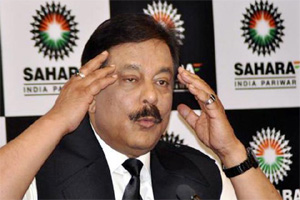 New Delhi, Feb 26: The Supreme Court on Wednesday issued a non bailable arrest warrant against Sahara chief Subrata Roy for his failure to appear before it in connection with the case in which his two companies have been directed to refund Rs 20,000 crore to investors.
New Delhi, Feb 26: The Supreme Court on Wednesday issued a non bailable arrest warrant against Sahara chief Subrata Roy for his failure to appear before it in connection with the case in which his two companies have been directed to refund Rs 20,000 crore to investors.
"We had already declined yesterday Roy's plea seeking exemption from personal appearance. He has not appeared even today and we are issuing non bailable warrant returnable for March 4," a bench comprising justices K S Radhakrishnan and J S Khehar said.
At the outset when senior advocate Ram Jethmalani, appearing for Roy, informed the court that Subrata Roy has been unable to appear because of the ill health of his 95-year-old mother, the bench shot back "the arms of this court are very long. Yesterday only we had refused your plea for exemption from personal appearance. We will issue the non bailable warrant. This is the Supreme Court of the land."
"Yesterday we told you that we are not inclined to exempt him from personal appearance. If other directors can appear, why can't you?," the bench said.
The court had on February 20 come down heavily on the Sahara group for not refunding Rs 20,000 crore of investors money despite its order and summoned Roy, Ravi Shankar Dubey, Ashok Roy Choudhary and Vandana Bhargava, directors of its firms--Sahara India Real Estate Corp Ltd (SIREC) and Sahara India Housing Investment Corp Ltd (SHIC) to be personally present before it on Wednesday.
Jethmalani sought to explain Roy's non-appearance by saying that he was sitting on the bedside of his ailing mother and holding her hand.
He also placed before the bench the medical certificate on Roy's mother's ill health and said on all earlier occasions, the Sahara chief had complied with the apex court's order.
However, the bench said, "for last two years we have been seeing what's happening in the matter".
The apex court had on Tuesday rejected Roy's plea seeking exemption from personal appearance and had asked him to be present before it today.
The bench had made it clear that "rule of law" has to be maintained and Roy has to comply with its February 20 order in which he along with three directors of his companies have been summoned to appear.
During the hearing earlier, the bench had observed that Sebi could go ahead with the sale of properties of the group whose sale deeds were handed over to the market regulator to recover Rs 20,000 crore.
"Those properties you can sell. We allow you to sell them and recover the money. If they are encumbered properties then you can file criminal case against the company. The case must be brought to a logical conclusion," the bench had said.
The bench had raised question on the way the group has been defying its order for the last one-and-a-half years.
The bench had said Sebi can put those properties on auction and get the money after the market regulator had said that let the company itself sell the properties and deposit the money.
The apex court in its judgment of August 31, 2012 had directed SEBI to attach properties and recover the money.
Sending a clear message that the court is not "helpless" in taking action for flouting its directions, the apex court had on November 21 last year barred Roy from leaving the country and also restrained the group from selling any of its properties.






Comments
Add new comment